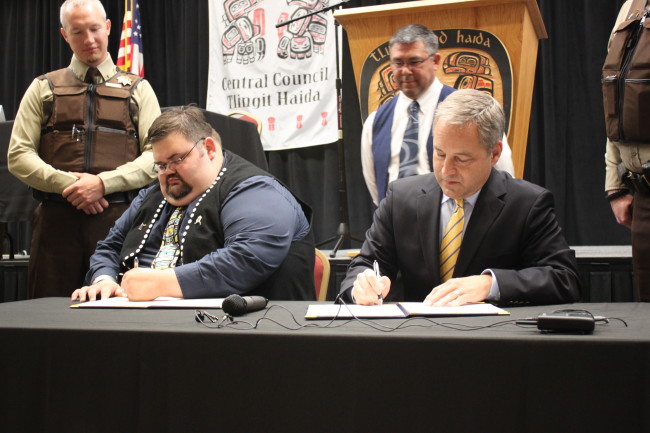Central Council of the Tlingit and Haida Indian Tribes of Alaska and the State of Alaska signed a Memorandum of Agreement yesterday signifying a new level of communication and cooperation between the two entities, focusing on education, workforce training and jobs. The Governor’s office says it’s the first of its kind.

Central Council and the State already work together on a number of projects and initiatives, like the Village Public Safety Officer program, financial assistance and childcare.
But Randy Ruaro says there can be even more collaboration. He’s special counsel and policy director for Gov. Sean Parnell.
“We do a lot of the same things. We do workforce training, we do early education. But we weren’t talking to each other on a regular basis in some of them. And so I thought I’ll just meet with Richard and just talk about it and see if we can try to formalize our relationship a little bit and get both sides talking and communicating,” Ruaro says.
Richard Peterson was elected president of Central Council in April. He says it’s natural for the first people of Alaska to be working with the State of Alaska.
“We can utilize our programs with the state’s programs to deliver better services to our communities and our people,” Peterson says.
The MOA focuses on areas of common interest, like economic development, public safety and energy. It establishes a systematic review of issues and programs by both entities to identify opportunities to work together.
Peterson says it’s already been a historic year for Alaska Natives with the passage of two pieces of legislation recognizing indigenous languages as official state languages and making November 14 Dr. Walter Soboleff Day.
He says the bills are a good start in further broadening the relationship with the state.
“The next step now, I think, is to start making sure that legislation that represents our needs is being introduced. And so we need to start getting aggressive, and by aggressive, I don’t mean that in any negative way. Really, it just means that we need to be at the table and active participants in what happens around us,” Peterson says.
In light of the MOA, the State and Central Council have already started a new partnership working with Microsoft to bring educational opportunities and IT training to tribal members throughout Southeast and the state.
Peterson says in order to foster the new relationship, Central Council has created a government affairs liaison position. On the state side, Ruaro will be taking the lead.
At the MOA signing, Gov. Sean Parnell said the management of the VPSO program in Southeast is a good example of an existing relationship between the state and Central Council, something the MOA will only make stronger.
“We’ve worked to improve VPSO retention but frankly, that’s another area where I’m going to need additional work with Central Council on, and that’s an issue statewide,” Parnell said. “Tlingit-Haida has sought out federal funds for vehicles. You know, we’ve all kind of done our part to work to improve and enhance the VPSO coverage and the tools that they have.”
The agreement between the State of Alaska and Central Council is good for three years.
Lisa Phu is a reporter at KTOO in Juneau.




